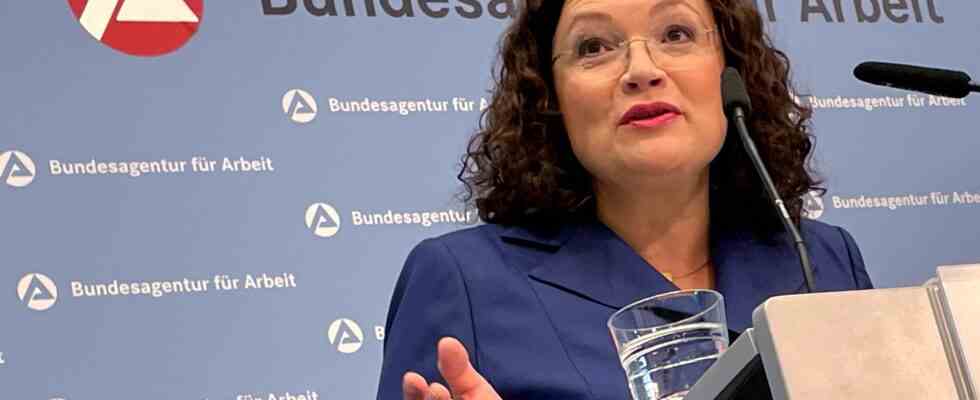Status: 09/24/2022 02:59 am
How hard could the impending decline in economic output hit Germany? Employment agency boss Nahles is not worried about the job market. And IG Metall considers the energy costs in the metal and electrical industry to be manageable.
According to most economists, Germany is heading towards a possible decline in economic output as a result of the energy crisis and the sharp rise in prices. However, as things stand at present, this impending recession will not have any massive impact either on the labor market or on the competitiveness of German companies – according to the estimates of the Federal Employment Agency (BA) and IG Metall.
“Yes, we are threatened with a recession,” said BA boss Andrea Nahles of the editorial network Germany. “But the good news is that the labor market is robust.” There is a shortage of skilled workers in many areas. “Anyone who loses their job now will find vacancies.” Should the crisis still have an impact on the labor market, it would be delayed. However, the number of companies inquiring about short-time work conditions is increasing. “This is an early indicator that there could be more short-time work again,” said Nahles.
“In any case, we are not on the brink”
IG Metall boss Jörg Hofmann meanwhile described a general concern about the competitiveness of German industry as exaggerated. In addition, there is no fear of a recession of the magnitude of the first Corona year. No research institute predicts that Germany will slide into a bad situation in the coming year as it did in 2020 at the beginning of the pandemic, he told the “Welt am Sonntag”. “The worst-case scenario of the forecasts we have would be a recession for the whole of 2023 with a minus of one to two percent. In the best-case scenario, it’s zero. In any case, we’re not on the brink.”
IG Metall boss Hofmann thinks general worries about the competitiveness of German companies are exaggerated.
Image: dpa
With a view to the consequences of the sharp increase in energy costs for companies, Hofmann made it clear that the share of energy costs in the metal and electrical industry is on average one to three percent. “Of course, doubling these costs hurts. It’s still manageable,” said Hofmann. Small and medium-sized companies in particular, which could not survive in the market without help, now need government support. In this context, the IG Metall boss called for a fourth relief package from the federal government. “I believe that a cap on electricity and gas would already do a lot,” says Hofmann. In particular, energy-intensive handicraft and industrial sectors would “not last long in this situation”.
S&P does not expect gas rationing in Germany
In its analysis published yesterday, the rating agency S&P also came to the conclusion that the German economy was heading for a recession in the coming months. But S&P expects Germany to be able to avoid gas rationing in the coming winter months as rising energy prices dampen demand enough to meet the official target of a 15 percent reduction in gas consumption.
Against this background, the rating agency confirmed the top rating “AAA” for Germany’s creditworthiness and pointed out that, among other things, Germany’s prosperous and diversified economy and the moderate public deficits and debt burdens continue to provide sufficient buffers for the rating.
Nagel holds the fight against inflation as a priority
Bundesbank President Joachim Nagel has meanwhile made it clear that further increases in interest rates are necessary despite the looming recession. “The main thing at the moment is fighting inflation,” he said at an event in Lucerne, according to the speech transcript. The Governing Council acted decisively with the two significant interest rate hikes in July and September. “Further tightening steps are in prospect and will have to come from my point of view,” said Nagel. He did not want to hide the fact that the fight against inflation will bring burdens with it. “It should temporarily dampen growth,” said the Bundesbanker. Inflation eats away wealth and hits the most vulnerable hardest. It stands in contradiction to the claim “prosperity for all”.

